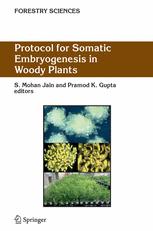

Most ebook files are in PDF format, so you can easily read them using various software such as Foxit Reader or directly on the Google Chrome browser.
Some ebook files are released by publishers in other formats such as .awz, .mobi, .epub, .fb2, etc. You may need to install specific software to read these formats on mobile/PC, such as Calibre.
Please read the tutorial at this link: https://ebookbell.com/faq
We offer FREE conversion to the popular formats you request; however, this may take some time. Therefore, right after payment, please email us, and we will try to provide the service as quickly as possible.
For some exceptional file formats or broken links (if any), please refrain from opening any disputes. Instead, email us first, and we will try to assist within a maximum of 6 hours.
EbookBell Team

4.0
96 reviewsEarlier, we edited a well received series on "Somatic embryogenesis in woody trees", volumes 1 to 6. These volumes provided readers extensive reviews on somatic embryogenesis of important angiosperm and gymnosperm tree species; an excellent source of information for newcomers or those already engaged in research. However, these book volumes did not cover stepwise "detailed protocols" for inducing somatic embryogenesis. This book contains 46 chapters, divided into 4 sections: A) 12 chapters on conifers, B) 14 chapters on fruits, C) 14 chapters on angiosperms, and D) 6 chapters on histology, bioencapsulation, protoplasts, cryopreservation, double staining and thin cell layer sectioning. The book provides stepwise protocols for somatic embryogenesis of a range of selected woody plants in order to assist researchers to initiate somatic embryogenic cultures without too much alterations in protocols. Each chapter provides information on initiation and maintenance of embryogenic cultures; somatic embryo development, maturation, and germination; acclimitization and field transfer of somatic seedlings. Some chapteres include applications of somatic embryogenesis cultures, e.g. protoplasts, encapsulation, cryopreservation, genetic transformation, genetic fidelity with molecular markers, and bioreactor.